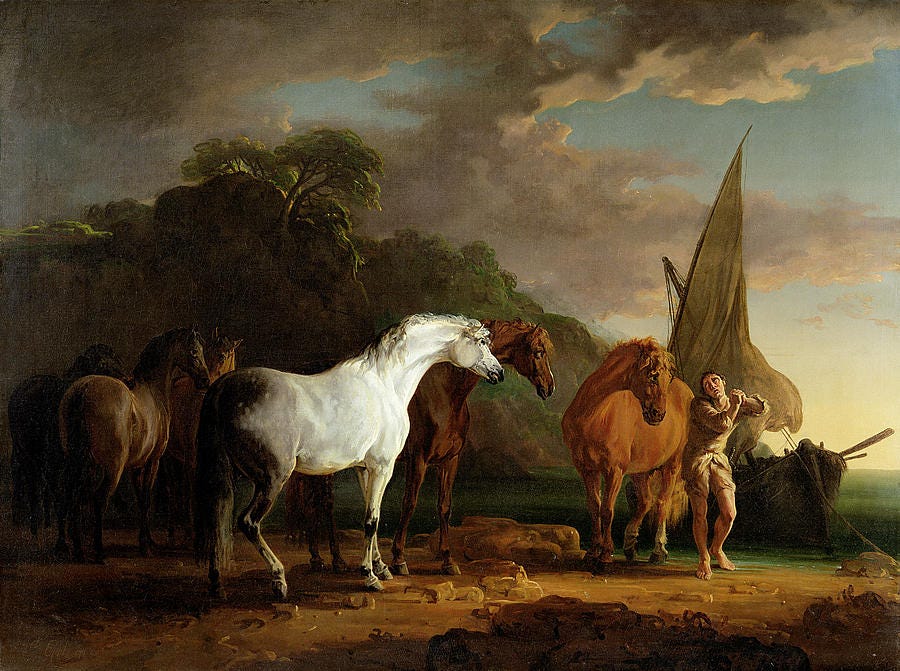
Wednesday
Like many people, I have been reluctant to apply the term “fascist” to Donald Trump—”authoritarian” or even “semi-fascist” has seemed less hysterical—but his speech this past weekend has removed any remaining doubts. It also puts me in mind of the most chilling parts of Gulliver’s Travels. More on that in a moment.
In his New Hampshire Veterans Day speech, as you’ve probably heard, Trump pledged to “root out the communists, Marxists, fascists and the radical left thugs that live like vermin within the confines of our country that lie and steal and cheat on elections.”
New York University history professor Ruth Ben-Ghiat, one of our leading experts on fascism, explains the speech’s significance. First, as she points out, Trump appears to be deliberately channeling Adolph Hitler and Benito Mussolini. ]Hitler in a 1920 speech referred to jews as “the black parasites of the nation” while Mussolini would joke about “rodents who carry infectious diseases from the East: the East that brings us lovely things, such as yellow fever and Bolshevism.”
Drawing on her knowledge of Italian and German fascism, Ben-Ghiat says that the purpose for such characterizations is to “get people to lose their aversion to violence.” In fact, Trump would like to “re-educate Americans to see violence as justified, patriotic, and even morally righteous.
His followers are falling into line. When pressed on the vermin speech, Trump’s campaign spokesman Steven Cheung said of those making Trump-Hitler comparisons that “their entire existence will be crushed when President Trump returns to the White House.” And as Trump talks about undocumented immigrants “polluting the blood of our country,” his 2025 advance team is circulating ideas about deporting millions of immigrants and “quarantining” others in massive camps. Trump even sounds proud of having taken children away from their parents.
So how does Jonathan Swift fit into all of this? In Book IV of Gulliver’s Travels, the 18th century satirist appears to be making Ben-Ghiat’s point that, once people have been sufficiently dehumanized, all kinds of atrocities become possible.
For instance, Gulliver finds reasonable the question that arises in a Houyhnhnm council meeting about “whether the Yahoos should be exterminated from the face of the earth?” Gulliver agrees with “one of the members for the affirmative,” whom he says “offered several arguments of great strength and weight, alleging, ‘that as the Yahoos were the most filthy, noisome, and deformed animals which nature ever produced, so they were the most restive and indocible, mischievous and malicious…’”
Gulliver would like the horses to exempt himself, of course, and is crushed when they lump him together with all the rest. Other than that, however, he has no problem with the Houyhnhnms calling in exterminators.
And now for the ghastly part. In moves that anticipate those Nazi concentration camps where Jews were turned into soap, mattress stuffing, and lamp shades, Gulliver uses humans for shoe leather:
I soled my shoes with wood, which I cut from a tree, and fitted to the upper-leather; and when this was worn out, I supplied it with the skins of Yahoos dried in the sun.
And then there is his boat, which is also made of human skin, as are the sails. These latter, needing to be more supple, require the skin of children:
I finished a sort of Indian canoe, but much larger, covering it with the skins of Yahoos, well stitched together with hempen threads of my own making. My sail was likewise composed of the skins of the same animal; but I made use of the youngest I could get, the older being too tough and thick…
Finally, he stops all the chinks with human fat:
I tried my canoe in a large pond, near my master’s house, and then corrected in it what was amiss; stopping all the chinks with Yahoos’ tallow, till I found it staunch, and able to bear me and my freight…
What is chilling about these passages is how matter of fact they are. In fact, readers might not notice the details, which makes Ben-Ghiat’s point. It’s as if anything can be normalized.
The more we close in on such a reality, the more accurate it will be to call Trump a fascist.

